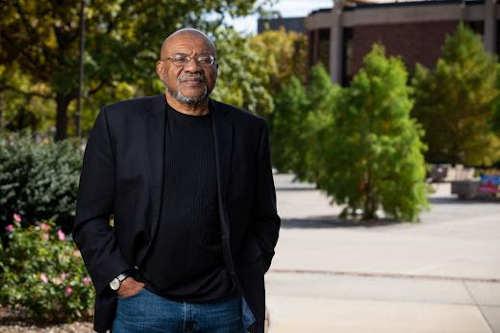Arts & Life

Marwa Helal’s poem is anchored by a line of aspiration and effort, “I am trying to tell you something,” a line, in other words, that might easily be the mantra of all poets.
In “generation of feeling,” she seems to say that poetry, language, and words, arranged and rearranged, alter, change the universe.
These lines should be reassuring even when we are bewildered and alarmed by the strange violence of the first stanza’s image: bones, fires, and the pains of growing.
She invites us to keep rearranging words to achieve hopeful meaning. Sometimes this is what poetry aspires to.
generation of feeling
By Marwa Helal
these growing pains though
this good will hunting
we
fallen twigs
look like bones
waiting to be lit
i am trying to tell you something about how
rearranging words
rearranges the universe
American Life in Poetry does not accept unsolicited manuscripts. It is made possible by The Poetry Foundation, publisher of Poetry magazine. It is also supported by the Department of English at the University of Nebraska-Lincoln. Poem copyright ©2019 by Marwa Helal, “generation of feeling” from Invasive species (Nightboat Books, 2019.) Poem reprinted by permission of the author and the publisher. Introduction copyright ©2022 by The Poetry Foundation. The introduction’s author, Kwame Dawes, is George W. Holmes Professor of English and Glenna Luschei Editor of Prairie Schooner at the University of Nebraska.
- Details
- Written by: Kwame Dawes
‘UNCHARTED’ RATED PG-13
What happens when you mix the first “Indiana Jones” movie with “Tomb Raider” and “National Treasure?” Since one of the three is actually based on a video game, we may arrive at the conclusion that “Uncharted” proves to be a hybrid of high-octane adventure and electronic thrills.
Given that it is based on the PlayStation video game by Naughty Dog, “Uncharted” could either go the dismal route of so many videogame-to-movie transitions that flopped or surprise with a rollicking sense of fun with some likable characters up against nasty foes.
With Tom Holland (“Spider-Man”) and Mark Wahlberg as the leads paired on a treasure hunt, this video game movie falls into the latter category, an unserious yet fun escapade involving affable con artists on a wild ride.
In the spirit of fantastic stunts that permeate a rough journey, the film begins with Holland’s Nathan Drake dangling perilously by a strap tied to cargo floating out of the rear of an airborne plane.
More thrills are in store, but first a flashback to Nathan’s childhood. History buff Nathan is seen as a 10-year-old orphan with his older brother Sam breaking into a museum.
Before being apprehended by security, the boys find their attention drawn to a vintage map of the world that offers a clue to where Spanish explorer Ferdinand Magellan hid a treasure valued at billions.
Separated by the authorities, Sam goes on the run and young Nathan grows up without family. In the present day, Nathan has become a New York City bartender juggling bottles like Tom Cruise in “Cocktail” and also moonlights as a pickpocket.
Recruited by Victor “Sully” Sullivan (Mark Wahlberg) with the admission of knowing his lost brother, Nathan’s interest is aroused by the scheme to search for Magellan’s gold fortune.
But first, Nathan and Victor must infiltrate a posh auction house and coordinate a tricky ploy to purloin a golden cross that unlocks clues that takes them to Barcelona and beyond.
Trust issues arise between the two treasure hunters, with Nathan dubious about his shady mentor’s honesty and credibility, and while they are not exactly bosom buddies, they share an obsession to find the cache of gold probably located in a pirate’s cove.
Once in Spain, they encounter one of Sully’s cronies, a young woman named Chloe (Sophia Ali) who is tough and resourceful. But she’s about as trustworthy as the scorpion in the fable that involves hitching a ride on a frog’s back with a false promise not to sting him.
An even greater challenge for Nathan and Sully is the obsession of the sinister Santiago Moncada (Antonio Banderas) who claims that Magellan’s lost treasure belongs to his family’s House of Moncada.
A more interesting and exceedingly dangerous villain is Moncada’s sexy confederate Jo Braddock (Tati Gabrielle), and unlike Chloe, there’s no mystery about what side she’s fighting on.
Amid the backstabbing, lies and double-crosses, piled on top of battling cutthroat thugs in a pizza parlor and on the high-seas and everywhere in-between, Victor and Nathan are on a bumpy road filled with some fast-paced and energetic thrills.
Knowing anything at all about the film’s origin in a video game is irrelevant for enjoyment of a rousing adventure where the bantering duo of Nathan and Sully turns on the chemistry of their wisecracks and feelings to deliver a satisfying buddy relationship.
What’s not to love about the spectacular stunts that come with 16th century Spanish galleons flying through the air for climactic battles between our heroes and Moncada’s cadre of henchmen and mercenaries?
Leaving open the almost certain possibility of a sequel, “Uncharted” could not ask for a better scenario than a repeat performance for the main protagonists and their female counterparts. “Uncharted” should set sail for its next chapter of risky ventures.
‘ANGELA BLACK’ ON SPECTRUM
A Spectrum Originals production, the limited series “Angela Black” is a spellbinding psychological thriller of a woman’s life seeming like a dream, but in reality, she’s living in a nightmare from which an escape may be elusive.
Angela (Joanne Froggatt) lives an ostensibly idyllic life in a lovely house in suburban London with two beautiful sons and a charming, hardworking husband, and volunteers at a dog shelter.
Behind this facade of charmed domesticity, Angela is a victim of domestic abuse at the hands of her spouse Olivier (Michiel Huisman). Though Olivier is controlling and brutal, Angela loves him and he’s the father of her children.
The daily abuse causes Angela to cover her bruises with makeup and fabricate lies to explain away her missing teeth. Until one day, Angela is approached by Ed (Samuel Adewunmi), a private investigator who smashes her already strained domestic life to pieces.
Ed reveals Olivier’s deepest secrets to Angela, and she is faced with horrifying truths about her husband and his betrayals.
Forced to take matters into her own hands, the situation could become desperate for a mother trying to protect her kids.
Tim Riley writes film and television reviews for Lake County News.
- Details
- Written by: Tim Riley

 How to resolve AdBlock issue?
How to resolve AdBlock issue? 











